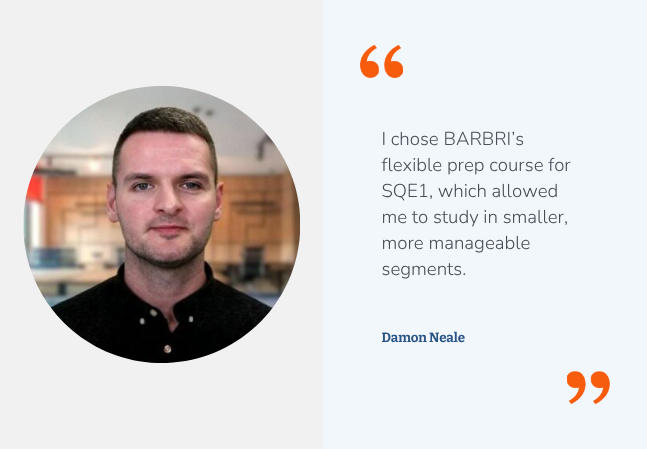Thank you!
The full article is available below.
You will also receive a follow-up email containing a link so you can come back to it later.

Damon Neale, an entrepreneur with an educational background in media and communications, transitioned into the world of law. He shares his story on pursuing a legal qualification through the SQE with us, how it shaped his career and gaining a passion for justice.
Damon, you began your career studying media and communications. How did you transition into the legal field?
My professional career started in the media sector and I originally studied media and communications at university. I later ventured into entrepreneurship starting and scaling multiple companies. My work as a business and IT consultant naturally led me to draft, negotiate, and review various legal agreements. Over time, I encountered several legal challenges—some personal and some professional—that highlighted the need for more accessible legal support, especially for those who can’t afford expensive legal advice. This led to my involvement in creating and founding The Law Corner, a charity that offers pro bono legal services to the community.
You mentioned experiencing legal injustices personally. Can you share more about that experience?
One of the most pivotal moments came in 2019 when I found myself in need of legal advice. I sought help from a local solicitor and other community members who offered their time. Through this experience, I realised there was a significant gap in access to affordable legal advice. Many simply can’t afford legal representation, and I was inspired to create a platform where people could receive free legal support.
Tell us more about The Law Corner and how it played a role in your decision to pursue the SQE.
The Law Corner is a charity dedicated to providing free legal advice to those who can't afford it. As part of my role, I provided legal advice under the supervision of qualified solicitors. It was an incredible experience, and the work I did there counted as my Qualifying Work Experience (QWE) for the SQE. In essence, this work was directly related to my eventual goal of qualifying as a solicitor. The more I got involved, the clearer it became that I wanted to formalise my qualifications so I could give legal advice independently, without requiring review by a qualified solicitor. That’s when I decided to pursue the SQE.
What challenges did you face while studying for the SQE, especially with your busy entrepreneurial lifestyle?
Finding time to study while running a business was incredibly difficult. My work required unpredictable hours and often involved early mornings and late nights, especially when working internationally. However, I chose a flexible prep course for SQE1, which allowed me to study in smaller, more manageable segments. I used methods like watching videos at double speed to save time and focused my revision on areas where I needed the most improvement, based on my practice exam results. This approach allowed me to squeeze study time into my days, whether it was between client projects, before bed, or whenever I could have some free time.
Can you explain how your entrepreneurial background helped you in your legal studies and work?
I’ve always been focused on solving complex problems and in my consultancy work, I had to interview clients to understand their needs, design solutions, and implement strategies. These skills—strategic thinking, communication, and problem-solving—are incredibly transferable to the legal profession. Even in my legal charity work, I had to apply these skills when advising clients, managing cases, and researching legal issues. In the future, I believe there may be a unique intersection where I can offer both legal and business solutions to clients, particularly in the startup and tech sectors where I have extensive experience.
What was your strategy for managing the balance between your business and your legal studies?
It required a lot of time management and prioritisation. I had to be very disciplined and selective about when I would study. I structured my study schedule around my work, breaking down sessions into smaller, achievable goals. I also made sure to study with minimal distractions and used every opportunity whenever I could, such as during travel or late at night. Being flexible and adaptable was key and I found that this approach allowed me to manage both my professional responsibilities and my studies.
What advice would you give to someone considering the SQE route?
My main piece of advice is to be kind to yourself and allow plenty of time to study. It’s a challenging journey, but with careful planning and self-discipline it’s absolutely achievable. Make sure you create a study schedule that works for your lifestyle, and don’t be afraid to adjust it as needed. It’s also important to stay focused and minimise distractions during your study time. Remember, the goal is to become a solicitor. It’s a marathon, not a sprint.
What’s next for you now that you’ve passed SQE1 and will be studying for SQE2?
Passing SQE1 was a huge milestone, but there’s still a lot of work ahead with SQE2. My plan is to continue providing legal advice through The Law Corner and gain further practical experience. Ultimately, I want to qualify as a solicitor so I can offer independent legal support, particularly for entrepreneurs and startups who need legal guidance but might not have the resources for traditional law firms. I also hope to integrate legal solutions into my consultancy services, helping clients not only with business strategies but with legal challenges too.
Want to read more inspiring SQE success stories? Check out more student stories here.
Unlock the Full Article
Bring Your Goals Within ReachTell us a little about yourself and your goals to display the full article and gain access to more resources relevant to your needs.
Interested in reading more? Fill out the form to read the full article.